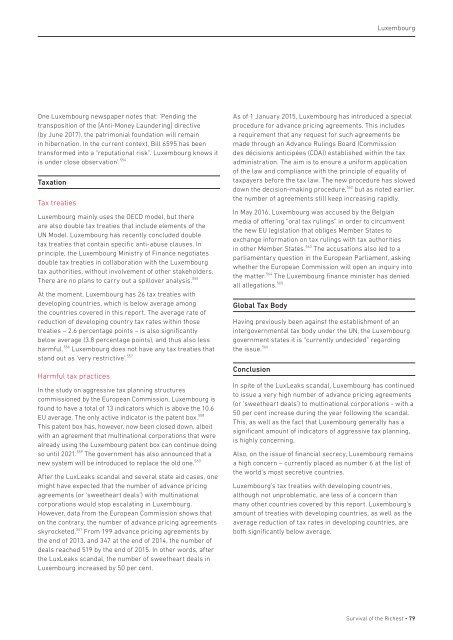Create successful ePaper yourself
Turn your PDF publications into a flip-book with our unique Google optimized e-Paper software.
Luxembourg<br />
One Luxembourg newspaper notes that: ‘Pending <strong>the</strong><br />
transposition <strong>of</strong> <strong>the</strong> [Anti-Money Laundering] directive<br />
(by June 2017), <strong>the</strong> patrimonial foundation will remain<br />
in hibernation. In <strong>the</strong> current context, Bill 6595 has been<br />
transformed into a "reputational risk". Luxembourg knows it<br />
is under close observation’. 554<br />
Taxation<br />
Tax treaties<br />
Luxembourg mainly uses <strong>the</strong> OECD model, but <strong>the</strong>re<br />
are also double tax treaties that include elements <strong>of</strong> <strong>the</strong><br />
UN Model. Luxembourg has recently concluded double<br />
tax treaties that contain specific anti-abuse clauses. In<br />
principle, <strong>the</strong> Luxembourg Ministry <strong>of</strong> Finance negotiates<br />
double tax treaties in collaboration with <strong>the</strong> Luxembourg<br />
tax authorities, without involvement <strong>of</strong> o<strong>the</strong>r stakeholders.<br />
There are no plans to carry out a spillover analysis. 555<br />
At <strong>the</strong> moment, Luxembourg has 26 tax treaties with<br />
developing countries, which is below average among<br />
<strong>the</strong> countries covered in this report. The average rate <strong>of</strong><br />
reduction <strong>of</strong> developing country tax rates within those<br />
treaties – 2.6 percentage points – is also significantly<br />
below average (3.8 percentage points), and thus also less<br />
harmful. 556 Luxembourg does not have any tax treaties that<br />
stand out as ‘very restrictive’. 557<br />
Harmful tax practices<br />
In <strong>the</strong> study on aggressive tax planning structures<br />
commissioned by <strong>the</strong> European Commission, Luxembourg is<br />
found to have a total <strong>of</strong> 13 indicators which is above <strong>the</strong> 10.6<br />
EU average. The only active indicator is <strong>the</strong> patent box. 558<br />
This patent box has, however, now been closed down, albeit<br />
with an agreement that multinational corporations that were<br />
already using <strong>the</strong> Luxembourg patent box can continue doing<br />
so until 2021. 559 The government has also announced that a<br />
new system will be introduced to replace <strong>the</strong> old one. 560<br />
After <strong>the</strong> LuxLeaks scandal and several state aid cases, one<br />
might have expected that <strong>the</strong> number <strong>of</strong> advance pricing<br />
agreements (or ‘swee<strong>the</strong>art deals’) with multinational<br />
corporations would stop escalating in Luxembourg.<br />
However, data from <strong>the</strong> European Commission shows that<br />
on <strong>the</strong> contrary, <strong>the</strong> number <strong>of</strong> advance pricing agreements<br />
skyrocketed. 561 From 199 advance pricing agreements by<br />
<strong>the</strong> end <strong>of</strong> 2013, and 347 at <strong>the</strong> end <strong>of</strong> 2014, <strong>the</strong> number <strong>of</strong><br />
deals reached 519 by <strong>the</strong> end <strong>of</strong> 2015. In o<strong>the</strong>r words, after<br />
<strong>the</strong> LuxLeaks scandal, <strong>the</strong> number <strong>of</strong> swee<strong>the</strong>art deals in<br />
Luxembourg increased by 50 per cent.<br />
As <strong>of</strong> 1 January 2015, Luxembourg has introduced a special<br />
procedure for advance pricing agreements. This includes<br />
a requirement that any request for such agreements be<br />
made through an Advance Rulings Board (Commission<br />
des décisions anticipées (CDA)) established within <strong>the</strong> tax<br />
administration. The aim is to ensure a uniform application<br />
<strong>of</strong> <strong>the</strong> law and compliance with <strong>the</strong> principle <strong>of</strong> equality <strong>of</strong><br />
taxpayers before <strong>the</strong> tax law. The new procedure has slowed<br />
down <strong>the</strong> decision-making procedure, 562 but as noted earlier,<br />
<strong>the</strong> number <strong>of</strong> agreements still keep increasing rapidly.<br />
In May 2016, Luxembourg was accused by <strong>the</strong> Belgian<br />
media <strong>of</strong> <strong>of</strong>fering “oral tax rulings” in order to circumvent<br />
<strong>the</strong> new EU legislation that obliges Member States to<br />
exchange information on tax rulings with tax authorities<br />
in o<strong>the</strong>r Member States. 563 The accusations also led to a<br />
parliamentary question in <strong>the</strong> European Parliament, asking<br />
whe<strong>the</strong>r <strong>the</strong> European Commission will open an inquiry into<br />
<strong>the</strong> matter. 564 The Luxembourg finance minister has denied<br />
all allegations. 565<br />
Global Tax Body<br />
Having previously been against <strong>the</strong> establishment <strong>of</strong> an<br />
intergovernmental tax body under <strong>the</strong> UN, <strong>the</strong> Luxembourg<br />
government states it is “currently undecided” regarding<br />
<strong>the</strong> issue. 566<br />
Conclusion<br />
In spite <strong>of</strong> <strong>the</strong> LuxLeaks scandal, Luxembourg has continued<br />
to issue a very high number <strong>of</strong> advance pricing agreements<br />
(or ‘swee<strong>the</strong>art deals’) to multinational corporations - with a<br />
50 per cent increase during <strong>the</strong> year following <strong>the</strong> scandal.<br />
This, as well as <strong>the</strong> fact that Luxembourg generally has a<br />
significant amount <strong>of</strong> indicators <strong>of</strong> aggressive tax planning,<br />
is highly concerning.<br />
Also, on <strong>the</strong> issue <strong>of</strong> financial secrecy, Luxembourg remains<br />
a high concern – currently placed as number 6 at <strong>the</strong> list <strong>of</strong><br />
<strong>the</strong> world’s most secretive countries.<br />
Luxembourg’s tax treaties with developing countries,<br />
although not unproblematic, are less <strong>of</strong> a concern than<br />
many o<strong>the</strong>r countries covered by this report. Luxembourg’s<br />
amount <strong>of</strong> treaties with developing countries, as well as <strong>the</strong><br />
average reduction <strong>of</strong> tax rates in developing countries, are<br />
both significantly below average.<br />
<strong>Survival</strong> <strong>of</strong> <strong>the</strong> <strong>Richest</strong> • 79


